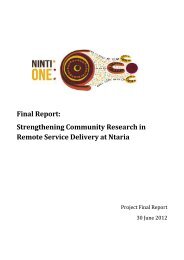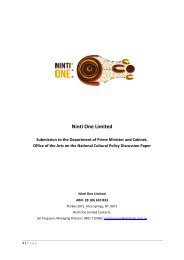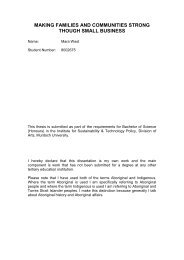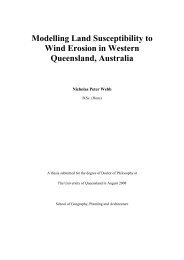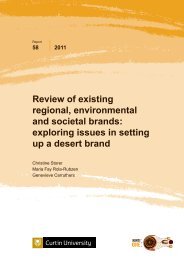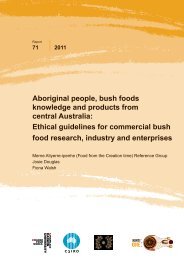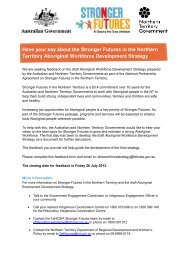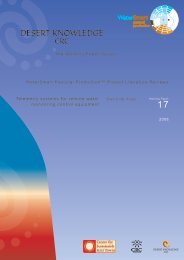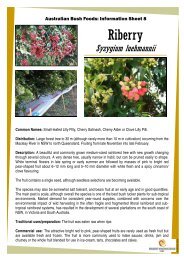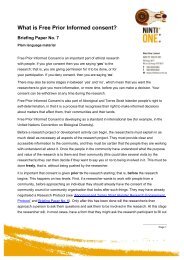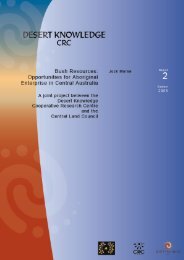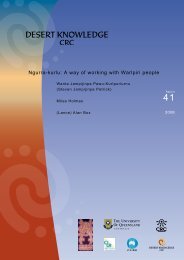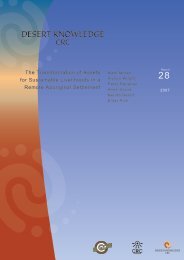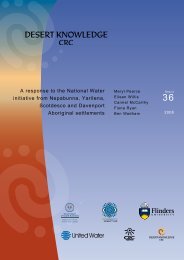ninti one limited
2011/12 Annual Report - Ninti One
2011/12 Annual Report - Ninti One
- No tags were found...
You also want an ePaper? Increase the reach of your titles
YUMPU automatically turns print PDFs into web optimized ePapers that Google loves.
InformatIon on • InnovatIon on • Ideas<br />
for remote australIa<br />
<strong>ninti</strong> <strong>one</strong> <strong>limited</strong><br />
RepoRt foR the yeaR 2011–12
NiNti ONe Limited<br />
Our visiON, missiON<br />
aNd vaLues<br />
Ninti One Limited has the vision of resilient remote communities and businesses that<br />
enrich Australia through their vigour, cultural integrity, ability to innovate, and sustainable<br />
use of resources. Through our research, expertise, education and outreach we provide the<br />
knowledge base essential to create these communities and economies.<br />
Our work is based on values created by our Board, leadership team, staff and stakeholders. They reflect<br />
many years experience of working with people and a wise discernment of what makes a creative, effective<br />
and enjoyable organisational culture. As an organisation we shall:<br />
Much of Australia’s wealth is created in our remote<br />
regions, yet many of the people who live there are<br />
excluded from the benefits of this economic activity.<br />
The impact of this exclusion on remote Australians,<br />
particularly Aboriginal and Torres Strait Islander<br />
people, is acknowledged by the Council of Australian<br />
Governments as a national policy priority.<br />
Ninti One Limited is a national not-for-profit company<br />
headquartered in Central Australia that is committed<br />
to solutions to the major challenges facing people in<br />
remote areas. We aim to:<br />
• address the social and economic challenges of<br />
people in remote Australia<br />
• embrace and protect the natural environment<br />
• find solutions to economic exclusion<br />
• improve understanding of Australia’s remote<br />
regions<br />
• increase people’s economic participation<br />
• increase people’s skills and capacity<br />
• understand the impact of climate change on the<br />
environment and people.<br />
Analysing the mobility patterns of those who live in remote<br />
areas, and addressing their needs, is essential to economic<br />
participation and development.<br />
We build on the expertise of our researchers and<br />
partners to extend the reach and influence of our<br />
work. Our networks of professional practiti<strong>one</strong>rs<br />
work in high-calibre multidisciplinary teams; these<br />
teams are able to compete for and attract contracts<br />
on cross-jurisdictional projects that have national and<br />
international focus.<br />
• build relationships that improve the lives of people in remote Australia<br />
• have respect for cultural diversity and the cultural authority of Aboriginal and Torres Strait Islander<br />
people<br />
• develop excellence in research, research application, management and governance systems<br />
• show courage, innovation and entrepreneurship<br />
• have integrity and empathy, and listen and learn<br />
• be responsive, open and accountable<br />
• create an enjoyable, stimulating and sustainable working environment.<br />
Our values are lived in a conscious way and are reflected in how we communicate with each other. At the<br />
core of Ninti One Limited is a way of doing things that values people and relationships, and this approach<br />
influences our work across a vast network of people and organisations throughout Australia and beyond.<br />
Understanding this is <strong>one</strong> of our greatest assets.<br />
www.<strong>ninti</strong><strong>one</strong>.com.au • 1
NINTI ONE<br />
<strong>ninti</strong> <strong>one</strong> partners<br />
our partners<br />
8 • www.<strong>ninti</strong><strong>one</strong>.com.au<br />
Ninti One Limited’s partners and stakeholders form<br />
part of our company; in 2011–12 we worked<br />
with more than 60 partners across Australia. These<br />
partners range from the large to the small, from<br />
federal government level to local community level,<br />
from international business to micro-business, from<br />
academia to hands-on end-user groups. Key research<br />
is provided by our major partners in the universities<br />
and CSIRO, with application and on-ground activities<br />
supported by our precinct and project partners.<br />
Partners help to define and plan our work. In<br />
some cases they contribute to a research project’s<br />
conception and design of its goals and programs.<br />
Collaborations are fundamental to the way Ninti One<br />
Limited operates. Bringing partners with us from the<br />
project inception and research through to the creation<br />
of the project’s outputs increases the impact of our<br />
work on the ground.<br />
Ninti One Limited also creates value for its partners in<br />
many ways. Partners of the CRC-REP research take<br />
part in a project’s governance and they contribute<br />
either financially or ‘in kind’, with skills, staff time,<br />
equipment or other resources. This participation<br />
entitles them access to and benefit from the results<br />
and outcomes of the research. There are many<br />
benefits in being a Ninti One Limited partner. As a<br />
diverse and collaborative organisation that works<br />
across disciplines we deliver new knowledge in the<br />
form of research results and research training. We<br />
work with our partners to broker new opportunities,<br />
services and employment that aim to apply our<br />
research results to the implementation of practical,<br />
on-ground projects.<br />
We also deliver intellectual property, commercial<br />
outcomes and information in a form that facilitates its<br />
adoption.<br />
The partner approach benefits our researchers too,<br />
providing scope to explore new fields related to the<br />
remote regions of the Australian continent, to develop<br />
their capacity to operate across very large distances<br />
and to partner successfully with Aboriginal and Torres<br />
Strait Islander and other remote organisations and<br />
industries.<br />
Photos this page:<br />
TOP: Photo: Libby Kartzoff<br />
BOTTOM: Aerial view<br />
of Desert Knowledge<br />
Precinct, Alice Springs<br />
Business and end-user partners<br />
Advanced Dynamics<br />
Alinytjara Wilurara NRM Board<br />
(South Australia)<br />
Anangu Pitjantjatjara<br />
Yankunytjatjara Lands<br />
Australian Wildlife Conservancy<br />
Biosecurity SA<br />
Centrefarm<br />
Central Land Council<br />
CleanGROW<br />
Coles<br />
Community Works<br />
Desart<br />
Desert Garden Produce Aboriginal<br />
Corporation<br />
Desert Knowledge Australia<br />
Education Transformation<br />
ARE HOSTED<br />
Where our<br />
research Leaders<br />
are hosted<br />
Graham (Polly) Farmer<br />
Foundation<br />
Iga Warta<br />
Keringke Arts<br />
Kimberley Land Council<br />
Kungka’s Can Cook<br />
Lhere Artepe Aboriginal<br />
Corporation<br />
Minerals Council of Australia<br />
Natural Resource Management<br />
Board NT Inc.<br />
Newmont Australia Ltd<br />
Ngaanyatjarra Council Inc.<br />
North Australian Pastoral Co.<br />
Northern Territory Cattlemen’s<br />
Association<br />
McPhee Andrewartha<br />
WHERE OUR WHERE RESEARCH OUR RESEARCH LEADERS LEADERS<br />
ARE HOSTED<br />
PERTH<br />
PERTH<br />
Host Institutions<br />
Remote Australia<br />
Host Institutions<br />
Remote Australia<br />
DARWIN DARWIN<br />
ALICE SPRINGS<br />
ALICE SPRINGS<br />
ADELAIDE<br />
Observant Pty Ltd<br />
Outback Communities Authority<br />
Outback Spirit<br />
Pila Nguru Aboriginal Corporation<br />
Precision Pastoral Pty Ltd<br />
Rangelands (NRM WA)<br />
RemoteBiz Pty Ltd<br />
Rio Tinto Services ltd<br />
Robins Foods Pty Ltd<br />
South Australian Arid lands NRM<br />
Board<br />
Tangentyere Council<br />
The Smith Family<br />
Titjikala Social Club<br />
Waltja Tjutangku Palyapayi<br />
ADELAIDE<br />
LISMORE<br />
ARMIDALE<br />
LISMORE<br />
MELBOURNE<br />
MELBOURNE<br />
ARMIDALE<br />
Government partners<br />
Australian Bureau of Statistics<br />
Department of Agriculture and Food<br />
(WA Government)<br />
Department of employment, economic<br />
Development and Innovation (Qld<br />
Government)<br />
Department of environment and<br />
Conservation (WA Government)<br />
Department of environment and<br />
Natural Resources (SA Government)<br />
Department of environment and<br />
Resource Management (Qld<br />
Government)<br />
Department of Families, Housing,<br />
Community Services and Indigenous<br />
Affairs (Australian Government)<br />
Department of Prime Minister and<br />
Cabinet Office for the Arts (Australian<br />
Government)<br />
Department of Regional Australia,<br />
Regional Development and local<br />
Government (Australian Government)<br />
Department of education, employment<br />
and Workplace Relations (Australian<br />
Government)<br />
Department of Indigenous Affairs (WA<br />
Government)<br />
Department of Natural Resources,<br />
environment, the Arts and Sport (NT<br />
Government)<br />
Department of Sustainability,<br />
Environment, Water, Population and<br />
Communities (Australian Government)<br />
Northern Territory Government<br />
university and<br />
research partners<br />
Australian Council for<br />
Educational Research<br />
Australian Institute of<br />
Aboriginal and Torres<br />
Strait Islander Studies<br />
Batchelor Institute of<br />
Indigenous Tertiary<br />
Education<br />
Centre for Appropriate<br />
Technology<br />
Centre for Remote Health<br />
Charles Darwin University<br />
CSIRO<br />
Curtin University<br />
Flinders University<br />
Griffith University<br />
Memorial University of<br />
Newfoundland, Canada<br />
Southern Cross University<br />
University of British<br />
Columbia, Canada<br />
University of the Free State,<br />
Karoo Development<br />
Foundation, South Africa<br />
University of New England<br />
University of South<br />
Australia<br />
www.<strong>ninti</strong><strong>one</strong>.com.au • 9
NINTI ONE<br />
strategic objectives<br />
our structure<br />
What We Want to Be<br />
A nationally and internationally recognised centre<br />
for expertise in remote communities and economic<br />
development.<br />
What We do<br />
Ninti One Limited is an organisation with a proven<br />
track record in project management, financial<br />
compliance, research completion and technology<br />
transfer. Our team is made up of highly qualified<br />
people experienced in achieving successful outcomes<br />
in remote settings. Success is founded on solid<br />
systems and clear strategies. With that in mind,<br />
the Board and senior management developed a<br />
strategic plan that provides organisational direction<br />
and ensures Ninti One Limited remains focused<br />
on delivering to its partners, communities and<br />
stakeholders.<br />
Ninti One Limited staff are committed to these<br />
strategies and goals and work collaboratively with<br />
respect for each other, our stakeholders and end<br />
users.<br />
Our head office is located in Alice Springs at the<br />
Desert Knowledge Precinct with key staff also based<br />
in Darwin, Adelaide, Perth and Canberra.<br />
Ninti One Limited operates three business units:<br />
• Business Innovation manages the research<br />
activity of CRC-REP.<br />
• Business Development is responsible for the<br />
development and commercialisation of intellectual<br />
property and our consultancy services.<br />
• Business Realisation provides essential services<br />
to the organisation such as financial management,<br />
contracting, human resources, ICT, monitoring and<br />
reporting, and communications.<br />
Our Business Realisation team has been strengthened<br />
this year with the appointment of Fran Kilgariff AM as<br />
General Manager, Business Operations. Fran brings<br />
with her a wealth of local experience and knowledge.<br />
We also welcomed Russell Raggatt as our new Senior<br />
Finance Officer.<br />
Photos this page:<br />
TOP: Lynette Swan at<br />
the reception of Ninti<br />
One Limited head office.<br />
Photo: Moving Pictures,<br />
April Goodman<br />
MIDDle: Photo: Moving<br />
Pictures, April Goodman<br />
We foster partnerships and collaborations in order to<br />
conduct high-quality research and broker knowledge that<br />
meets substantial national challenges and benefits end<br />
users in remote Australia.<br />
hoW We do it<br />
We work in a collaborative, cross-cultural and<br />
interdisciplinary way to address enduring and systemic<br />
problems in remote Australia.<br />
With Whom We Work<br />
A diversity of partners, stakeholders and communities to<br />
strengthen their capacity.<br />
Where We do it<br />
Extensively across remote Australia and through a system<br />
of strategic nodes, in order to attract expertise and<br />
investment to benefit remote Australia.<br />
hoW We measure our performance<br />
We are accountable to partners, stakeholders and<br />
communities through effective systems for measuring<br />
performance and evaluating impact.<br />
10 • www.<strong>ninti</strong><strong>one</strong>.com.au<br />
www.<strong>ninti</strong><strong>one</strong>.com.au • 11
NINTI ONE acTI<br />
TIvITIE<br />
ITIEs<br />
Chris Crafter, Jeff Foulkes, Alicia Whittington and Jayne<br />
Brim-Box developing vegetation monitoring methodology<br />
for the AFCMP at Simpsons Gap, Northern Territory.<br />
hoW We Work<br />
12 • www.<strong>ninti</strong><strong>one</strong>.com.au<br />
Ninti One Limited recognises that the goal of<br />
sustainable and healthy communities in remote<br />
Australia is intrinsically linked with the participation,<br />
ownership and partnership of the residents of those<br />
communities in the initiatives that affect their lives.<br />
Our formal collaborations with over 60 government,<br />
private sector and community organisations enable us<br />
to deliver and manage complex economic, social and<br />
environmental projects across remote Australia. This<br />
capacity is further enhanced by formal relationships<br />
with Aboriginal and Torres Strait Islander organisations<br />
(who form <strong>one</strong>-third of the partners of Ninti One<br />
Limited) and by our staff, who have intercultural<br />
skills and long-standing professional relationships<br />
with many Aboriginal and Torres Strait Islander<br />
communities.<br />
Ninti One Limited is structured to provide the best and<br />
most strategic delivery of our contract management,<br />
research and on-ground activities. Each area of our<br />
operations applies itself in the most appropriate way.<br />
For example, our CRC-REP sees the whole subject of a<br />
research project, not just its comp<strong>one</strong>nt parts. This is<br />
called a ‘whole of systems’ approach. This approach<br />
is most successful in identifying the key drivers and<br />
causes of economic disadvantage in remote areas<br />
and the methods required to overcome them.<br />
Other project areas operate differently. Our research<br />
into services in remote Australia has taught us that a<br />
picture of a system is best built through knowledge<br />
from different sources. For the research to arrive<br />
at recommendations to improve services through<br />
a system-based analysis, we bring together three<br />
different types of knowledge: local knowledge held by<br />
consumers and citizens; scientific knowledge held by<br />
researchers; and policy and administrative knowledge<br />
held by governments, service providers and nongovernment<br />
organisations. To overlook any of these<br />
sources risks missing an important part of the puzzle.<br />
This flexible, multidisciplinary approach is critical<br />
to our success. It is our key strength, <strong>one</strong> that is<br />
fundamental to the delivery of tangible benefits for<br />
our stakeholders. Indeed, it is the only way to work<br />
in remote Australia, and the only way to ensure<br />
that those who have the greatest needs receive the<br />
greatest service.<br />
Photo this page:<br />
Remote Australia boasts<br />
some spectacular scenery<br />
www.<strong>ninti</strong><strong>one</strong>.com.au • 13
NINTI ONE acTIvITIE<br />
ITIEs<br />
aBoriGinaL community researchers<br />
Community Researchers<br />
using computer tablets<br />
to conduct How families<br />
look after people in Mimili<br />
survey. Photo: Sam Osborne<br />
14 • www.<strong>ninti</strong><strong>one</strong>.com.au<br />
Our approach to successful research in remote<br />
Aboriginal and Torres Strait Islander communities<br />
is founded on the principle that when community<br />
members work as researchers in their home<br />
community, new knowledges and opportunities are<br />
created for future research, informed decision making<br />
and genuine on-the-ground change. This approach<br />
encourages innovative methodologies and works<br />
from community priorities and values in the research<br />
process.<br />
Ninti One Limited has a strong commitment to<br />
employing Aboriginal Community Researchers; the<br />
process is supported by our senior research staff, who<br />
engage a range of community members in the design,<br />
accountability and responsibility for their research<br />
work. Senior community members with high levels of<br />
cultural knowledge and expertise are engaged. Our<br />
research involves and is accountable to bodies such<br />
as councils and community organisations.<br />
The shift from ‘outsider researcher’ to ‘community<br />
researcher’ opens the space for authentic<br />
engagement, expert consideration of community<br />
values, languages and other dynamics that often<br />
inhibit research due to the lack of cultural, linguistic<br />
and community capacity of external researchers.<br />
Working as a community researcher builds<br />
understanding and confidence in the breadth of a<br />
research question and injects new skills and capacity<br />
into the community. Our approach supports a range of<br />
skills development, cultural positions, language and<br />
literacy. Researchers talk with the community and<br />
support interested team members to develop skills<br />
and confidence.<br />
Typically, skills are developed across the research<br />
process, including ethics and ethical research,<br />
methodologies, respectful and inclusive research<br />
practice, interviewing techniques, data collection,<br />
analysis and reporting. This year, for example, we<br />
employed community researchers in developing<br />
computer tablet surveys. It is envisaged that this skill<br />
development will be applicable to other employment<br />
opportunities in their communities. In 2011–12,<br />
41 Aboriginal Community Researchers have been<br />
contracted to work with Ninti One Limited research,<br />
including the CRC-REP.<br />
Photos this page:<br />
TOP: Ntaria Community<br />
Researchers review and<br />
discuss research findings.<br />
Photo: Judy Lovell<br />
MIDDle: Community<br />
Researchers developing<br />
questions for the Bush<br />
Medicine surveys<br />
BOTTOM: Ada Lechleitner<br />
conducting a safe<br />
driving survey with local<br />
residents. Photo: Judy<br />
Lovell<br />
www.<strong>ninti</strong><strong>one</strong>.com.au • 15
16 • www.<strong>ninti</strong><strong>one</strong>.com.au<br />
NINTI ONE acTIvITIE<br />
ITIEs<br />
austraLian feraL cameL manaGement project<br />
Camels are a significant invasive species that<br />
roam across remote Australia, causing more<br />
than $10 million worth of damage to infrastructure<br />
and livelihoods each year. This four-year $19 million<br />
project completed its third year of operation in<br />
2011–12, and a new annual work plan for the<br />
fourth operational year was submitted to the<br />
Australian Government. It is <strong>one</strong> of the largest<br />
and most diverse collaborations ever to target an<br />
established feral species in Australia.<br />
The project established landholder consents for<br />
commercial and non-commercial feral camel removal<br />
across more than 1.3 million square kilometres. As<br />
of 30 June, around 75,000 feral camels had been<br />
removed, with around 15,000 of these removed from<br />
the more accessible areas for commercial use (pet<br />
meat and human consumption). The project is on<br />
track to achieve its aim to reduce camel densities to<br />
agreed targets in 18 specific biodiversity areas across<br />
3.3 million square kilometres. Further to this, almost<br />
500 Aboriginal people have been trained in monitoring<br />
and managing feral camel impacts.<br />
The project has led to improved information on feral<br />
camel densities, movements and impacts, which<br />
will be invaluable in guiding future feral camel<br />
management. Project partners placed 50 satellite<br />
collars on feral camels and flew aerial surveys over<br />
more than 500,000 square kilometres to inform<br />
current and future management activities. Based<br />
on recent aerial survey work, we believe that the<br />
population currently stands at around 750,000. We<br />
continue to refine this figure as we undertake further<br />
removal and aerial survey work.<br />
Another innovative outcome from this project is<br />
the extensive biodiversity-monitoring program that<br />
uses motion-activated cameras on site near inland<br />
waterholes across the Northern Territory. These<br />
images not only provide evidence of the damage that<br />
feral camels cause, but also confirm the large number<br />
of native animal species that depend on these scarce<br />
desert water sources.<br />
In June 2012, Ninti One <strong>limited</strong> hosted the ABC’s<br />
Lateline program to film a story which highlighted the<br />
impact of feral camels on the environment, cultural<br />
sites, inland water sources and the pastoral industry.<br />
Photo this page:<br />
Feral camels eating<br />
vegetation near a remote<br />
waterhole in the southern<br />
Northern Territory<br />
captured using remote<br />
monitoring cameras.<br />
Feral camels – shown here at Warakurna, South Australia<br />
– can cause damage to infrastructure when they<br />
descend upon remote communities searching for water.<br />
Photo: Ngaanyatjarra Council<br />
afcmp project partners<br />
Alinytjara Wilurara NRM Board (South Australia)<br />
Anangu Pitjantjatjara Yankunytjatjara Lands<br />
Australian Wildlife Conservancy<br />
Biosecurity SA<br />
Central Land Council<br />
CSIRO<br />
Department of Agriculture and Food WA (WA<br />
Government)<br />
Department of environment and Conservation<br />
(WA Government)<br />
Department of environment and Natural<br />
Resources (SA Government)<br />
Department of environment and Resource<br />
Management (Qld Government)<br />
Department of Natural Resources, environment,<br />
the Arts and Sport (NT Government)<br />
Flinders University<br />
Kimberley Land Council<br />
Natural Resource Management Board NT Inc.<br />
Ngaanyatjarra Council Inc.<br />
Ninti One Limited<br />
NT Cattlemen’s Association<br />
Rangelands (NRM WA)<br />
South Australian Arid lands NRM Board<br />
www.<strong>ninti</strong><strong>one</strong>.com.au • 17
commerciaLisation<br />
NINTI ONE acTIvITIE<br />
ITIEs<br />
Brunchilly Station. Photo: Tim Driver<br />
precision pastoraL pty Ltd<br />
remote Livestock manaGement<br />
system eLements<br />
18 • www.<strong>ninti</strong><strong>one</strong>.com.au<br />
Ninti One Limited manages the intellectual property<br />
(IP) developed through our research, including the<br />
CRC program. Commercialising Ninti One Limited’s<br />
research outputs is <strong>one</strong> of our key strengths. Our<br />
organisation is building an experienced team of people<br />
dedicated to identifying market opportunities, seeking<br />
out stakeholders, and negotiating and managing<br />
commercial agreements.<br />
Capturing, protecting and managing Aboriginal and<br />
Torres Strait Islander IP is fundamental to much of<br />
our activities. Ninti One <strong>limited</strong>’s five-member IP and<br />
Ethics Board subcommittee provides oversight and<br />
strategic direction to this area of our work.<br />
Ninti One Limited is a member of the joint venture<br />
start-up company Precision Pastoral Pty Ltd which<br />
manages the IP generated from the development of<br />
the Remote livestock Management System (RlMS).<br />
RlMS is an innovation that stands to introduce<br />
huge efficiencies and improvements in the pastoral<br />
industry. RlMS has been proved to reduce labour<br />
and operational expenses per animal, almost halving<br />
the cost per head in northern Australia, and enables<br />
a degree of management precision previously<br />
unavailable to the industry.<br />
In 2011–12 Precision Pastoral Pty ltd worked closely<br />
with Meat and Livestock Australia, the University of<br />
Queensland and Kidman and Co. to investigate the<br />
impacts of feeding cattle a phosphorous supplement.<br />
RlMS allows the control and treatment of animals<br />
to be run in the same paddock with only the control<br />
animals being supplied the supplement. This is the<br />
first time that this has been possible on an extensive<br />
enterprise.<br />
The use of the RlMS in a beef research trial in<br />
Richmond, Queensland, has been very successful in<br />
engaging the northern beef industry and connecting<br />
and comparing performance of animals being<br />
managed under the same conditions.<br />
Precision Pastoral Pty Ltd is an active partner<br />
in the work of the CRC-REP’s Precision Pastoral<br />
Management Tools project – an indication of the<br />
great synergies that are possible under the Ninti One<br />
Limited operating system.<br />
These RlMS research activities are providing<br />
outcomes for the pastoral industry and assisting with<br />
the development of a commercial RlMS product.<br />
Photos this page:<br />
TOP: The Remote Livestock<br />
Management System<br />
(RLMS) allows a degree<br />
of precision in drafting<br />
previously unavailable to<br />
pastoral enterprises.<br />
BOTTOM: RLMS is making<br />
measurable differences<br />
to operational costs<br />
for remote pastoral<br />
businesses.<br />
www.<strong>ninti</strong><strong>one</strong>.com.au • 19
NINTI ONE acTIvITIE<br />
ITIEs<br />
We build on the expertise of our research<br />
and partners to extend the reach and<br />
influence of our work. Photo Sarah Long<br />
communication<br />
20 • www.<strong>ninti</strong><strong>one</strong>.com.au<br />
Ninti One Limited’s Communication Unit provides<br />
the interface between the organisation’s Board,<br />
researchers, partners, stakeholders, end users and<br />
public. Its work takes many forms, including research<br />
reporting and academic publications; reactive and<br />
proactive media activity; newsletters, website content,<br />
public briefing material; parliamentary submissions;<br />
presentations, conferences and events; promotional<br />
material; and award nominations. The unit manages<br />
the public face of the organisation with the goal of<br />
becoming the ‘<strong>one</strong>-stop shop’ for evidence-based<br />
information about remote Australia and strengthening<br />
the voices of local expertise.<br />
The unit develops and manages communication plans<br />
for individual projects; and maintains a contacts,<br />
publications and resources database, image and<br />
audio-visual library and media networks. It develops<br />
research briefing information in collaboration with<br />
our researchers and staff so as to maintain brand<br />
recognition and consistency across the organisation.<br />
hiGhLiGhts for 2011–12<br />
The Ninti One Limited website was developed and<br />
launched. The site, which went live in April 2012,<br />
hosts material from the previous nine years of Ninti<br />
One <strong>limited</strong> work. In this year our website received<br />
over 50,000 visits.<br />
Thirty Ninti One Limited events were held across the<br />
country.<br />
Eleven editions of our electronic newsletter were<br />
distributed to our 2,300 subscribers.<br />
Media activity this year resulted in national coverage<br />
about issues, including remote education, community<br />
values for mining, natural resource management<br />
through our Australian Feral Camel Management<br />
Project, and desert services that work.<br />
A new online resource centre (www.<strong>ninti</strong><strong>one</strong>.com.<br />
au/resourcecentre) now provides public access<br />
to nine years of Ninti One <strong>limited</strong> IP, including<br />
our publications, journal articles, conference<br />
presentations, audio-visual materials and outputs.<br />
Research publications by Ninti One Limited led to<br />
783 academic citations of our work in 87 journals,<br />
up from 527 in 63 journals last year. The average<br />
citation rate increased to 9, up from 8.37 last year.<br />
‘Global desertification: building a science for dryland<br />
development’, which appeared in the internationally<br />
recognised journal Science, continues to be our most<br />
highly cited publication.<br />
Photos this page:<br />
TOP: Tom Calma, AO and<br />
Jan Ferguson discuss<br />
Ninti One Limited<br />
research with Her<br />
Excellency, The Governor<br />
General. Photo: Sarah<br />
Long<br />
MIDDle: Photo: Sarah Long<br />
BOTTOM: Ngarli Ellis<br />
working at Keringke Art<br />
Centre<br />
www.<strong>ninti</strong><strong>one</strong>.com.au • 21
NINTI ONE acTIvITIE<br />
ITIEs<br />
Community Researchers presenting their<br />
research finding to their local community.<br />
Photo: Sam Osborne<br />
community deveLopment<br />
22 • www.<strong>ninti</strong><strong>one</strong>.com.au<br />
Ninti One Limited has long been aware of the value<br />
and impact of research that is designed with local<br />
community participation from the outset. Historically,<br />
it is rare for local residents to work as researchers. In<br />
many of Ninti One Limited’s research activities, this is<br />
now an established practice and has shown exciting<br />
results in the quality and insights achieved.<br />
The presence of local people as members of research<br />
teams can lead to benefits beyond the focus of the<br />
research itself and contributes to the long-term goals<br />
of community development:<br />
• local researchers are often able to get to the heart<br />
of the matter in conducting surveys, interviews and<br />
focus groups. This means identifying underlying<br />
causes and effects for the community.<br />
• Confidence in research processes grows when<br />
residents see Aboriginal people doing the work,<br />
leading to a greater commitment to the research<br />
and the relevance of its results.<br />
• employment, team work and leadership all grow<br />
through the research and this strengthens the<br />
community.<br />
Recent Ninti One Limited research projects that have<br />
supported community development include:<br />
Remote Indigenous Household and Indigenous<br />
Housing, Territory 2030 Household Survey was<br />
commissi<strong>one</strong>d by the Department of the Chief Minister<br />
to collect baseline data about the community’s<br />
awareness and understanding of the Northern Territory<br />
2030 Strategic Plan. Aboriginal and Torres Strait<br />
Islander Community Researchers were employed to<br />
ensure cultural and language factors were included in<br />
the research process and survey instruments.<br />
Nyangatjatjara College ‘MindMatters’ Survey was<br />
carried out for Nyangatjatjara College and Principals<br />
Australia in order to find out the perceptions of<br />
students in Imanpa, Mutitjulu and Docker River about<br />
the college and its MindMatters mental health and<br />
wellbeing program.<br />
Strengthening Community Research in Remote<br />
Service Delivery, for the Australian Government<br />
Department of Families, Housing, Community Services<br />
and Indigenous Affairs, focused on evaluating local<br />
Implementation Plans, and worked to understand<br />
governance and road safety, two topics identified as<br />
priorities by the Aboriginal Community Researchers.<br />
Photos this page:<br />
TOP: Waltja and Ninti<br />
One Limited working<br />
together on supporting<br />
and strengthening<br />
community research<br />
MIDDle: Patjarr<br />
Community at sunset,<br />
Ngaanyatjarra Lands,<br />
WA. Photo Tim Acker<br />
BOTTOM: Roslyn<br />
Raberabera surveys<br />
residents about safe<br />
driving. Photo: Judy<br />
Lovell<br />
www.<strong>ninti</strong><strong>one</strong>.com.au • 23
NINTI ONE acTIvITIE<br />
ITIEs<br />
cooperative research centre for remote economic participation<br />
Regional Economies<br />
Investing in Regional Economies<br />
through:<br />
• Mobility and labour markets<br />
• Maximising regional impact of<br />
mining investment<br />
• Climate and energy futures<br />
Remote Australia holds the key to much of Australia’s<br />
secure, low-emission energy future through abundant<br />
solar, geothermal, tidal, wind and wave energy sources.<br />
Solar Facility, Ntaria. Photo: Libby Kartzoff<br />
The CRC-REP is a federally funded collaborative<br />
public good research program that works with<br />
communities, businesses and people in remote<br />
regions of Australia to investigate and provide<br />
practical responses to the complex issues that drive<br />
economic participation. The CRC-REP is focused<br />
on delivering solutions to the economic challenges<br />
that affect remote Australia. Through its research,<br />
CRC-REP provides practical responses to the complex<br />
issues that can restrict full economic participation.<br />
It is a partnership program, a platform of more than 50<br />
members that include the Australian<br />
Government and four state and<br />
territory government departments,<br />
numerous non-government<br />
organisations, universities and<br />
other research providers, private<br />
businesses and industries. Thirty<br />
percent of its partner members<br />
are from Aboriginal and Torres<br />
Strait Islander organisations and<br />
communities.<br />
The research program is divided into three areas:<br />
1. Regional Economies builds robust regional<br />
economies throughout remote Australia through our<br />
partners in government, industry and communities.<br />
This will provide the sustainable employment and<br />
enterprise opportunities vital to increasing the level<br />
of economic participation for remote Australians.<br />
2. Enterprise Development creates successful<br />
models for micro, small and medium-sized<br />
enterprises (MSMes) that are appropriate to remote<br />
locations and inclusive of Aboriginal and Torres<br />
Strait Islander culture.<br />
3. Investing in People uses ‘soft systems’<br />
approaches linked with the Sustainable livelihoods<br />
Framework to interpret the complex factors leading<br />
to chronic educational and employment challenges.<br />
Our ‘whole of system’ approach sets out to<br />
understand the key drivers and causes of the<br />
economic challenges in remote areas and to identify<br />
successful methods to overcome them.<br />
Photo this page:<br />
Photo: Moving Pictures,<br />
April Goodman<br />
Enterprise Development<br />
Investing in Enterprise<br />
Development through:<br />
• economic participation from<br />
cultural knowledge<br />
• Technology and innovation<br />
transforming remote businesses<br />
CRC<br />
for Remote<br />
Economic<br />
Participation<br />
Challenge:<br />
Addressing economic and social<br />
disadvantage in remote Australia<br />
Investing in People<br />
Investing I<br />
in People through:<br />
• The<br />
interplay between health,<br />
wellbeing, education and<br />
employment<br />
• Pathways to work and enterprise<br />
• Remote education<br />
and training<br />
24 • www.<strong>ninti</strong><strong>one</strong>.com.au<br />
www.<strong>ninti</strong><strong>one</strong>.com.au • 25
NINTI ONE acTIvITIE<br />
ITIEs<br />
Ninti One Limited reaches out to every corner of remote<br />
Australia through its network of partners and associates.<br />
Photo: Murray McGregor<br />
cooperative research centre for remote economic participation<br />
hiGhLiGhts for 2011–12<br />
All project areas had their research and activities<br />
approved by the Board’s ethics committee.<br />
Recruitment of Principal Research Leaders (PRLs)<br />
was completed, as was recruitment of academic<br />
candidates at doctoral, masters, honours and VET<br />
levels.<br />
Consultations were held with stakeholders for each<br />
project to ensure the integrity of the research design<br />
and its capacity to inform change in the long term.<br />
Advisory groups were formed to provide a forum for<br />
stakeholders and end users to provide feedback to our<br />
research leaders and steer future opportunities arising<br />
from research outputs.<br />
Sites for CRC-ReP projects span Australia, from the<br />
Anangu Pitjantjatjara Yankunytjatjara lands in South<br />
Australia, through to the Kimberley, across the Top End<br />
and into Cape York and the Torres Strait Islands. The<br />
diversity of our fieldwork locations enables us to cover<br />
region-specific issues affecting remote Australia.<br />
This year our research generated the preparation<br />
of over ten papers and literature reviews, five<br />
submissions to the federal government, and<br />
presentations by our researchers at national and<br />
international conferences.<br />
The hard work of our staff resulted in excellent<br />
progress in the achievement of Commonwealth<br />
milest<strong>one</strong>s for the CRC program. Fourteen of 15<br />
milest<strong>one</strong>s were completed, our finances were<br />
successfully audited, and our in-kind contributions<br />
are on track. Our annual partner project briefing took<br />
place in Alice Springs in May and was extremely well<br />
attended.<br />
Our Research Quality, Monitoring and evaluation<br />
framework will ensure a whole-of-systems approach<br />
to our research while our Output to Usage to Impact<br />
Framework sets out our approach to achieving the<br />
creation, identification and extraction of value for<br />
participants, stakeholders and end users.<br />
Photos this page:<br />
TOP: Desert Graffiti: Patjarr<br />
Community, Ngaanyatjarra<br />
Lands. Photo Tim Acker<br />
MIDDle: Photo: Maryanne<br />
Gray<br />
BOTTOM: Photo: Judy Lovell<br />
26 • www.<strong>ninti</strong><strong>one</strong>.com.au<br />
www.<strong>ninti</strong><strong>one</strong>.com.au • 27
NINTI ONE acTIvITIE<br />
ITIEs<br />
Brown Goshawk at Anna’s Reservoir, Northern Territory,<br />
photographed by remote monitoring camera deployed<br />
by Jayne Brim-Box and Pat Hodgens Northern Territory<br />
Department of Land Resource Management.<br />
naturaL resource manaGement<br />
28 • www.<strong>ninti</strong><strong>one</strong>.com.au<br />
Ninti One Limited has extensive experience in<br />
managing large natural resource management<br />
projects, which we do in collaboration with industry,<br />
peak bodies and cross-jurisdictional government<br />
agencies at federal, state, territory and local level.<br />
Management of remote Australia’s natural resources<br />
requires extensive collaborations and partnerships<br />
that operate across state and territory boundaries<br />
and cross-cultural networks. Ninti One Limited is<br />
developing a strong reputation for managing these<br />
complex relationships through our leadership in the<br />
Australian Feral Camel Management Project.<br />
Our expertise spans all phases of technical assistance<br />
in a project cycle, including scoping studies and<br />
appraisal, design, implementation, procurement of<br />
goods and services, fund management, capacity<br />
building, communication, sectoral research and<br />
monitoring and evaluation. We specialise in projects<br />
affecting the rangelands.<br />
The Australian Collaborative Rangelands Information<br />
System (ACRIS) provides natural resource<br />
management and environmental information for<br />
decision makers – from regional bodies responsible<br />
for natural resource management, to government<br />
policy makers – to make better decisions about<br />
how we manage our rangelands. This project is an<br />
example of our collaboration with partner CSIRO.<br />
ACRIS provides a structure to monitor the condition<br />
of the diverse environments of rangelands Australiawide.<br />
This service coordinates the collaboration<br />
of partners who collect information and data on<br />
the value and production of agricultural (including<br />
pastoral) production in the rangelands, update<br />
socio-economic profiles of rangeland bioregions,<br />
examine data collected in the Agricultural Resource<br />
Management Survey (ARMS) and compile data on the<br />
value and production of mining. ACRIS was awarded<br />
the 2011 Northern Territory Research and Innovation<br />
Award in the Desert Knowledge category.<br />
Pat Hodgens, Jayne<br />
Brim-Box, Catherine<br />
Nano, Quentin Hart and<br />
Don Waller conducting<br />
vegetation assessments,<br />
Petermann Ranges,<br />
Northern Territory.<br />
www.<strong>ninti</strong><strong>one</strong>.com.au • 29
<strong>ninti</strong> <strong>one</strong> activities<br />
Decisions about remote Australia are rarely made in<br />
remote Australia. Our work at policy level has already<br />
had significant impact on policy makers, leading to<br />
direct and tangible benefits for remote Australians.<br />
impact<br />
30 • www.<strong>ninti</strong><strong>one</strong>.com.au<br />
Measuring the impact of research activities that<br />
focus on social and economic development<br />
is a challenging business for two reasons. First, in<br />
complex and dynamic systems there are many factors<br />
that lead to change, and research may be only <strong>one</strong> of<br />
them. Second, improvements on the ground in remote<br />
Australia are likely to be achieved some years in the<br />
future but will be due to the activities of Ninti One<br />
Limited now.<br />
This section focuses on impact in two ways: the<br />
influence of the work of Ninti One Limited, and the<br />
uptake of our research outputs.<br />
The potential influence of our work has been<br />
strengthened this year by our focus on expanding<br />
our policy networks, consolidating our public image<br />
and Ninti One Limited brand, and increasing the<br />
availability of our publications and resources through<br />
the online resource centre, www.<strong>ninti</strong><strong>one</strong>.com.au/<br />
resourcecentre. Our work this year resulted in national<br />
opinion pieces published on issues such as remote<br />
education, community value from mining activity, feral<br />
camel management and desert services that work.<br />
Influence also comes from participation in national<br />
advisory groups and other forums. Our Managing<br />
Director, Ms Jan Ferguson, was appointed to three<br />
federal advisory boards in 2011–12: the Indigenous<br />
Business Policy Advisory Group; the Round Table on<br />
the National Food Plan green paper; and the Land<br />
and Sea Management Board. Jan also attended the<br />
Indigenous Chamber of Commerce Advisory Board<br />
Conference. Many of our Ninti One Limited staff<br />
contribute to policy and practice by participating in<br />
various boards and committees.<br />
Examples of the uptake of Ninti One Limited research<br />
to influence policy and practices include:<br />
• In November 2011, the Northern Territory Minister<br />
for Local Government announced major changes to<br />
the vote-counting system for multi-member wards<br />
in local government elections. This was a result<br />
of an official review by Professor Benjamin Reilly<br />
which included the research findings from a former<br />
DKCRC project on the basic inequities in the existing<br />
electoral system in the Northern Territory.<br />
• The roll-out of the AFCMP, which was established as<br />
a result of Ninti One Limited research on assessing<br />
the impacts of feral camels, has resulted in<br />
approximately 100,000 camels being removed from<br />
18 biodiversity hot spots across remote Australia.<br />
Photos this page:<br />
TOP: Photo: Murray<br />
McGregor<br />
MIDDle: Photo: Maryanne<br />
Gray<br />
BOTTOM: Photo: Judy Lovell<br />
www.<strong>ninti</strong><strong>one</strong>.com.au • 31
WHO IS NINTI ONE?<br />
our Board<br />
Ninti One Limited is governed by a Board of<br />
Directors, which includes the Chairperson and<br />
Deputy Chairperson. Under our constitution, at least<br />
two Directors must be of Aboriginal or Torres Strait<br />
Islander descent, and either the Chairperson or the<br />
Deputy Chairperson must be Aboriginal or Torres Strait<br />
Islander. Directors are appointed from nominations<br />
made by area-based electoral colleges of essential<br />
partners. The Managing Director is appointed by<br />
the Board and is also a Director. Currently, 60% of<br />
our Board is made up of Aboriginal or Torres Strait<br />
Islander people.<br />
The Board also maintains three subcommittees that<br />
manage key aspects our work. These subcommittees<br />
(Audit and Risk Management; Intellectual Property<br />
and ethics; and Research Quality and Innovation)<br />
are made up of Board members, with input from<br />
appropriate stakeholder representation.<br />
tom caLma ao<br />
chair<br />
Tom, an Aboriginal<br />
man from the NT, is the<br />
National Coordinator,<br />
Tackling Indigenous<br />
Smoking. Tom served<br />
as Race Discrimination<br />
Commissi<strong>one</strong>r from<br />
2004 until 2009, and is<br />
the former Aboriginal<br />
and Torres Strait<br />
Islander Social Justice<br />
Commissi<strong>one</strong>r with the<br />
Australian Human Rights<br />
Commission. Tom has a<br />
long and distinguished<br />
career in social justice,<br />
community development,<br />
and as a senior policy<br />
adviser.<br />
hetti perkins,<br />
deputy chair<br />
Hetti Perkins is a member<br />
of the Eastern Arrernte<br />
and Kalkadoon Aboriginal<br />
nations and, until<br />
recently, was the senior<br />
curator of Aboriginal and<br />
Torres Strait Islander art<br />
at the Art Gallery of New<br />
South Wales in Sydney.<br />
Hetti has worked with<br />
Indigenous visual art for<br />
over twenty years. She<br />
was an adviser to the<br />
2008 Biennale of Sydney,<br />
is a member of numerous<br />
cultural organisations,<br />
and is Chair of the Charlie<br />
Perkins Trust for Children<br />
and Students.<br />
GLenise couLthard<br />
Glenise is an<br />
Adnyamathanha woman<br />
from the Northern<br />
Flinders Ranges. She is<br />
the Manager Aboriginal<br />
Health for the Port<br />
Augusta Hospital Cluster<br />
(Roxby, Woomera, Leigh<br />
Creek, Hawker and<br />
Quorn) and a Director on<br />
the board of the Royal<br />
Flying Doctor Service<br />
Central Operations. She is<br />
<strong>one</strong> of a team of founding<br />
members of the Iga Warta<br />
Cultural Tourism Venture<br />
in the Northern Flinders<br />
Ranges.<br />
ian davey<br />
Ian is an emeritus<br />
Professor of the<br />
University of South<br />
Australia. He was Pro<br />
Vice Chancellor and Vice<br />
President for Research<br />
& Innovation at the<br />
University from 1994 to<br />
2005 and Chair of the<br />
Research Committee at<br />
the University of Adelaide<br />
from 1987 to 1990.<br />
Ian has extensive CRC<br />
Board experience, having<br />
served on the boards<br />
of six CRCs since the<br />
program was established<br />
in 1991.<br />
jan ferGuson<br />
Jan is the Managing<br />
Director of Ninti One<br />
Limited and the CRC-REP.<br />
She has a long-term<br />
connection to the<br />
Northern Flinders Ranges<br />
in remote Australia and<br />
a strong commitment<br />
to improving the lives,<br />
communities and<br />
prospects of remote<br />
people. Jan has been<br />
Managing Director of<br />
Ninti One Limited since<br />
2005 and has extensive<br />
experience in public<br />
administration, research<br />
management and desert<br />
living.<br />
haroLd furBer<br />
Harold grew up in the<br />
remote Arnhem Land<br />
community Minjilang.<br />
He holds a BA in<br />
Administration from the<br />
University of Canberra<br />
and has worked in the<br />
public and private sectors<br />
as an administrator<br />
and educator. He is the<br />
Deputy Chair of Desert<br />
Knowledge Australia and<br />
also Chair of the Desert<br />
Peoples Centre.<br />
tanya hosch<br />
Tanya is a Torres Strait<br />
Island woman working<br />
as a consultant with<br />
corporate, philanthropic,<br />
government and<br />
non-government<br />
organisations in areas<br />
of social policy including<br />
Aboriginal and Torres<br />
Strait Islander affairs,<br />
youth and leadership<br />
development, women’s<br />
issues and health. She<br />
serves on a range of<br />
boards, and is working on<br />
the establishment of an<br />
Indigenous Governance<br />
Institute.<br />
aLison paGe<br />
Alison is an Aboriginal<br />
woman with links to<br />
Walbanga and Wadi<br />
Wadi peoples of the Yuin<br />
nation. She is a designer,<br />
artist and cultural planner<br />
whose work explores<br />
links between cultural<br />
identity, art and the built<br />
environment. She is the<br />
Executive Officer of the<br />
Saltwater Freshwater Arts<br />
Alliance and has been a<br />
regular member of the<br />
judging panel on the<br />
ABC’s New Inventors.<br />
david ritchie<br />
David was, until recently,<br />
the Chief Executive<br />
Officer of the Northern<br />
Territory Department<br />
of Lands and Planning<br />
and has previously<br />
headed several agencies<br />
responsible for Aboriginal<br />
cultural heritage, the<br />
natural environment<br />
and housing and<br />
infrastructure in remote<br />
communities. He holds a<br />
doctorate in anthropology<br />
and is a fellow of the<br />
Australian Institute of<br />
Company Directors.<br />
tony tate<br />
Tony retired from<br />
his position as<br />
Director, Research<br />
and Development,<br />
Curtin University in<br />
December 2011. He is<br />
an experienced research<br />
manager with a long<br />
record of working in<br />
community organisations.<br />
He has been involved<br />
with a significant number<br />
of CRCs, and comes<br />
from a background<br />
of meteorology and<br />
oceanography. He has<br />
also held senior positions<br />
at TAFE and Murdoch<br />
University.<br />
32 • www.<strong>ninti</strong><strong>one</strong>.com.au<br />
www.<strong>ninti</strong><strong>one</strong>.com.au • 33
WHO IS NINTI ONE?<br />
Ochre cliffs at Iga Warta, Northern Flinders Ranges, South<br />
Australia. Ochre is integral to Aboriginal culture. Each colour<br />
has a range of different uses and meanings. Photo: Skye Akbar<br />
our people our peopLe<br />
The Ninti One Limited<br />
Executive Group<br />
is made up of the key<br />
managers in the areas<br />
of research, innovation,<br />
operations and business<br />
development. This<br />
group provides strategic<br />
direction to Principal<br />
Research Leaders and is<br />
the key point of contact<br />
between our Board and<br />
our staff.<br />
staff<br />
Our staff are either employed by Ninti One <strong>limited</strong> or through our partner organisations.<br />
Tammy Abbott, senior research Officer<br />
Tim Acker, prl, aboriginal and torres strait islander art economies<br />
Melodie Bat, rO, remote education systems<br />
Boyd Blackwell, rO, enduring community value from mining<br />
Andy Bubb, australian feral camel management project<br />
Sheree Cairney, prl, interplay between health, wellbeing, education and employment<br />
David Campbell, rO, interplay between health, wellbeing, education and employment<br />
Jane Cooper, executive Officer to the managing director<br />
Linda Cooper, communication manager<br />
Mike Dockery, prl, population mobility and labour markets<br />
Tim Driver, md, precision pastoral pty ltd<br />
Chris Duncan, rO, remote education systems<br />
Kelly Franklin, program assistant, corporate<br />
John Guenther, prl, remote education systems<br />
Quentin Hart, National director, australian feral camel management project<br />
Charity Hinchliffe, program assistant, finance<br />
Damien Jacobsen, prl, aboriginal and torres strait islander tourism product<br />
Apolline Kohen, senior research Officer<br />
PRL = Principal Research Leader<br />
RO = Research Officer<br />
Slade Lee, prl, plant business<br />
Sally Leigo, prl, precision pastoral management tools<br />
Judy Lovell, senior research Officer<br />
Tim Maddocks, communication Officer<br />
Iona Matthews, student liaison<br />
Fiona McKenzie, prl, enduring community value from mining<br />
Eva McRae-Williams, prl, pathways to employment<br />
Sam Osborne, senior research Officer<br />
Digby Race, prl, climate adaptation energy futures and carbon economies in remote<br />
australia<br />
Russell Raggatt, senior finance Officer<br />
Lisa Stefanoff, rO, aboriginal and torres strait islander art economies<br />
Lynette Swan, receptionist<br />
Peter Twigg, prl, aboriginal and torres strait islander cultural enterprise<br />
Ange Vincent, program coordinator<br />
Karina Walker, human resources Officer<br />
Alice Woodhead, rO, aboriginal and torres strait islander art economies<br />
The Ninti One Limited Executive Group: (left to right) Mark Ashley, General Manager Business Development; Murray<br />
McGregor, General Manager Research, Quality and Innovation; Jane Cooper, Executive Officer; Jan Ferguson, Managing<br />
Director; Fran Kilgariff AM, General Manager Operations; and Kevin Williams, General Manager Research, Evaluation<br />
and Impact.<br />
34 • www.<strong>ninti</strong><strong>one</strong>.com.au<br />
www.<strong>ninti</strong><strong>one</strong>.com.au • 35
The fuTure<br />
ure<br />
NINTI ONE LIMITED PARTNERS<br />
Building on the strength of the past nine years of<br />
Ninti One Limited practice, the Board made the<br />
decision in December 2011 to move Ninti One <strong>limited</strong><br />
to an on-going entity structure.<br />
The aspiration is for Ninti One Limited to be an<br />
independent, well-resourced, nationally and<br />
internationally recognised organisation undertaking<br />
research and community development with the<br />
capacity to speak authoritatively on issues affecting<br />
remote regions of Australia. To achieve this, the<br />
management team is currently undertaking feasibility<br />
work to develop a business plan and future funding<br />
models.<br />
Limited constitutional base, and legal and operational<br />
systems provides strong governance and capacity to<br />
accommodate this growth.<br />
Earlier this year we commenced a series of<br />
workshops with our partners and stakeholders to<br />
assist us in shaping our future work agenda and<br />
refining a business model for the organisation.<br />
RemoteBIZ<br />
Pty Ltd<br />
Desert Garden Produce<br />
Aboriginal Corporation<br />
Karoo Development<br />
Foundation<br />
Precision Pastoral<br />
Pty Ltd<br />
The enduring Ninti One Limited organisation will<br />
build on the best aspects of our work with the CRC<br />
Program and successful business development<br />
activities. It will tackle new areas of research<br />
and research application that will benefit remote<br />
Australians and build the capacity to enable our<br />
extensive remote regions to become a source of<br />
global competitive advantage. The existing Ninti One<br />
Photos this page:<br />
TOP: Mark Inkamala using<br />
Ipad to run the Comunity<br />
Perception survey with<br />
Tuwunpa Rangers<br />
MIDDle: Photo: Jan<br />
Ferguson<br />
BOTTOM: Hugh Gorge<br />
WRITTeN AND PRODUCeD BY NINTI ONe lIMITeD AND BRUDeRlIN MacleAN PUBlISHING SeRvICeS.<br />
36 • www.<strong>ninti</strong><strong>one</strong>.com.au
cover photo: Droughtmaster<br />
cows at Old Man Plains<br />
Research Station, Alice<br />
Springs. Agricultural produce<br />
from Australia’s rangelands<br />
contributes $8.4 billion dollars to<br />
the nation’s economy.<br />
Photo: Sally Leigo<br />
<strong>ninti</strong> <strong>one</strong> <strong>limited</strong><br />
email: info@<strong>ninti</strong><strong>one</strong>.com.au<br />
ph<strong>one</strong>: +(61) 08 8959 6000<br />
web: www.<strong>ninti</strong><strong>one</strong>.com.au<br />
street address<br />
Business & Innovation Centre<br />
Desert Knowledge Precinct<br />
South Stuart Highway<br />
Alice Springs NT 0870<br />
Australia<br />
postal address<br />
PO Box 3971<br />
Alice Springs NT 0871<br />
Australia



